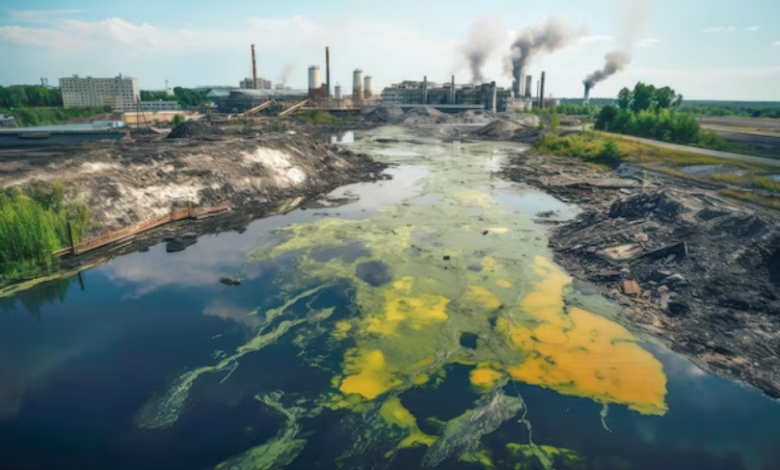The Impact of Industrial Pollution on Your Tap Water Quality

The Impact of Industrial Pollution on Your Tap Water QualityvIndustrial activities have played a pivotal role in the economic growth and development of modern societies. However, they have also led to increased pollution of our surrounding environment, including water sources.
In this blog post, we seek to bring into focus the negative impacts of industrial pollution on tap water quality.
We will also discuss the various ways through which industrial waste contaminates our drinking water supplies and compromises its safety. Further, we will outline some effective methods to treat tap water at the household level to ensure it is clean and safe for drinking.
Negative Impacts of Industrial Pollution on Your Tap Water Quality
Here are some of the most common negative impacts of industrial pollution on your tap water quality.
- Chemical Contamination
Industrial facilities discharge a wide variety of chemicals into nearby water bodies during production processes. These include heavy metals, pesticides, solvents, plastics, and other synthetic organic compounds.
Many of these chemicals are toxic even in minute concentrations and do not break down easily in the environment. They eventually find their way into underground aquifers and municipal water supplies.
Long-term exposure to chemically contaminated water poses significant health risks like cancer, organ damage and other illnesses.
- Microbial Pollution
Industrial waste may contain pathogens like viruses, bacteria, and protozoa. If dumped without proper treatment, these microbes can infiltrate drinking water sources. Those with compromised immunity are particularly vulnerable to diseases spread through contaminated water.
Microbial pollution often surpasses chemical pollution in directly causing waterborne epidemics. It is a serious concern where sewage and industrial waste jointly pollute surface and groundwater.
- Toxic Heavy Metals
Several industrial sectors extensively use heavy metals like lead, mercury, cadmium and arsenic in their operations. These heavy metals have a tendency to biomagnify in the food chain and have cumulative and long-lasting impacts on human health.
Even low concentrations of toxic heavy metals consumed regularly over years can lead to neurological impairments, organ damage and cancer. They also hamper the normal functioning of treatment plants, rendering water unsafe to drink.
- Disruption of Natural Water pH
Industrial waste is frequently acidic or alkaline owing to the various chemicals and processes involved. When such waste mixes with natural water bodies, it drastically alters their pH levels. Sustained changes in water acidity/alkalinity can severely impact the delicate aquatic ecosystem.
It also interferes with water treatment processes and corrodes distribution pipelines over time. Deranged pH makes tap water unfit for drinking and other domestic purposes.
Read also: Adding a Touch of Luxury to Your Home Using Cost-Effective Methods
- Suspended Solids and Sediments
Many industries discharge effluents laden with suspended particles and sediments. These solids, on entering water bodies, make the water murky and turbid.
Turbid water is not only an aesthetic issue but poses health risks as suspended particles can shelter pathogens and heavy metals, preventing their removal through conventional treatment. It also clogs pipelines and blocks sunlight from reaching deeper waters, impacting aquatic photosynthesis.
How You Treat Tap Water to Ensure Safety
There are several point-of-use treatment methods one can adopt at home to guarantee the safety of tap water for drinking and cooking purposes:
Boiling:
Boiling water for at least one minute kills most pathogens by increasing the temperature above their survival limits. However, it does not remove toxins or heavy metals. It is recommended to boil water for at least 5-10 minutes. Doing so will ensure that all the major bacteria have been killed.
It is important to note that, boiling water is quite a time-consuming task. This can be especially true when you have to boil a huge amount of water. And for that, you will obviously require a big container.
Water filters:
Using a water filer is one of the most effective ways to treat contaminated tap water. In the market, different types of water filters like activated carbon, reverse osmosis (RO), ultraviolet (UV), etc are available that you can consider purchasing. Each filter has its own advantages and disadvantages, and good at removing certain types of contaminants.
That’s why it is recommended to make a choice wisely by considering both your budget and specific water filtration requirements.
Ion exchange:
This treatment replaces undesirable metal ions in water with more acceptable ones like calcium or sodium through resin exchange. The resin exchange is made up of small beads that are charged and then able to attract and hold captions.
So, when the water flows through it, the resin beads effectively attract and bind to specific ions. It is useful to remove toxic heavy metals.
Water distillation & Solar disinfection:
These are two different methods; in water distillation, water is boiled, condensed back to liquid form, and collected. Since only water vapor passes through, it effectively removes all kinds of dissolved impurities. However, distillation is an energy-intensive option.
Solar disinfection involves exposing water, ideally in transparent bottles, to direct sunlight for 6 hours can deactivate most pathogens through heat and UV radiation. It is a low-cost sustainable method but not reliable for removing non-biological toxins.
Proper treatment of tap water at the household level can certainly minimize health risks arising from industrial pollution. However, stronger regulations and compliance are needed to curb toxic effluent discharge at the source to resolve the issues plaguing our water supplies and environment permanently.
Frequently Asked Questions
What exactly is industrial pollution?
It is a type of pollution that leads to the contamination of the environment especially air, water, and soil, all because of the industrial activities.
What specific contaminants from industries can pollute the tap water?
Although, there is a long list of impurities that we can mention here, some of the specific ones include the followong:
- Organic chemicals
- Heavy metals
- Biological contaminants
All these originate from different sources of factories and can make tap water extremely dangerous to drink.
Ending Note
As the world is becoming industrialized, industrial pollution is becoming a huge health concern. It is contaminated underground water sources which ultimately poor tap water quality. In this blog post, we have explained the negative impacts of industrial pollution of regular water. We have also discussed how you can overcome this issue.




